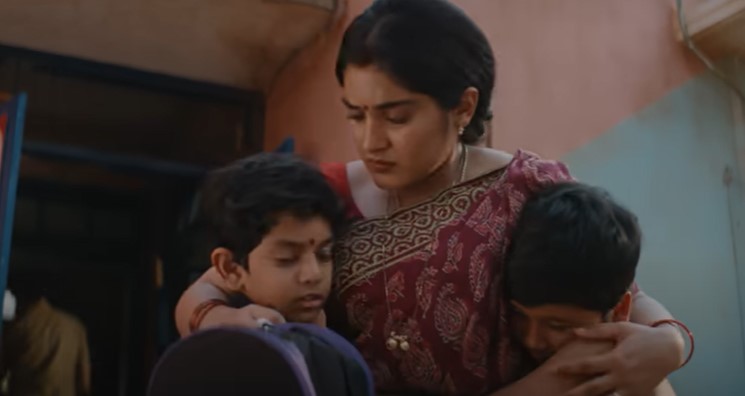September 7, 2024: 35: Chinna Katha Kaadu, directed by debutant Nanda Kishore Emani, takes audiences on a heartwarming journey through the everyday struggles of a lower-middle-class family. Set in the small town of Tirupathi, this Telugu drama explores the deeply emotional bond between a mother and her son, while subtly questioning the pressures imposed by the educational system. What starts as a simple story of academic failure gradually unfolds into a much more meaningful tale of resilience, love, and the power of questioning established norms.
The film centers around Arun (Abhay Bethiganti), a curious yet academically challenged child who struggles with mathematics. Arun’s failure in math leads to his demotion to his younger brother Varun’s (Arun) class, all thanks to a cold and calculating teacher, Chanakya (Priyadarshi). This shift devastates his mother, Saraswati (Nivetha Thomas), who sees her son’s failure as a reflection of her own academic shortcomings. The film beautifully portrays how she rises above her own insecurities to help Arun confront his fears.
Nivetha Thomas Delivers a Career-Defining Performance
One of the strongest pillars of 35: Chinna Katha Kaadu is Nivetha Thomas’s exceptional portrayal of Saraswati, a mother who refuses to give up on her son. Her performance is both subtle and powerful, highlighting the emotional depth of a parent who sees beyond academic results. Saraswati’s determination to help her son pass his math exam, despite her own tenth-grade failure, adds an authentic and deeply relatable layer to her character.
Director Nanda Kishore Emani deserves credit for portraying Saraswati’s internal conflict with sensitivity and grace. Through her, he conveys the important message that learning is not about grades, but about understanding, persistence, and self-belief.
35: Chinna Katha Kaadu Review: A Thought-Provoking Take on Education and Parenting
The film also raises critical questions about the education system’s rigid focus on marks and numbers. Arun’s struggle with math is not just about poor academic performance—it’s a symbol of how many children feel alienated by a system that rarely encourages creativity or independent thought. Priyadarshi’s character, Chanakya, represents this very system, where students are often labeled based on their academic scores rather than their potential.
Through Arun’s journey, the film makes a compelling case for nurturing children’s curiosity and giving them the space to grow at their own pace. Arun’s frustration with the arbitrary rules of mathematics, especially his struggle to understand the concept of zero, serves as a metaphor for how disconnected students can feel from traditional learning structures.
Stellar Cinematography and Music Complement the Narrative
The technical aspects of 35: Chinna Katha Kaadu are equally noteworthy. Niketh Bommi’s cinematography captures the essence of a small-town Brahmin household with great attention to detail. Every frame feels lived-in, transporting viewers into the world of Saraswati and her family. Vivek Sagar’s music, blending classical and modern sounds, complements the film’s tone perfectly, adding depth to the emotional moments.
A Few Shortcomings, but the Emotional Depth Shines Through
While the film offers a strong emotional core, there are moments where the pacing feels slow, and certain plot developments become predictable. The narrative follows a conventional trajectory, which might make it feel familiar for seasoned moviegoers. However, these minor issues are overshadowed by the powerful performances and the film’s heartwarming message.
Conclusion: A Heartwarming Story of Family, Struggles, and Triumph

35: Chinna Katha Kaadu stands out as a thought-provoking family drama that goes beyond a simple academic struggle. It reminds viewers of the importance of empathy, both in parenting and education, and underscores the idea that failure is just a stepping stone to success. With stellar performances, especially from Nivetha Thomas, and a meaningful message, this film is a must-watch for anyone who believes in the power of love, learning, and second chances.






